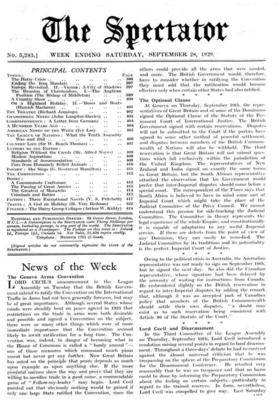The Optional Clause • At Geneva on Thursday, September 19th,
the repre- sentatives of -Great Britain -and of some of the Dominions signed the Optional Clause of the Statute of the Per- manent Court of International Justice. The British Government signed with certain reservations. Disputes will not be submitted to the Court if the parties have agreed to some other method of peaceful settlement, and disputeS between members of the British Common- wealth of Nations will also be withheld: The third reservation is that Great Britain will not submit ques- tions which fall exclusively within the jurisdiction of the United Kingdom. The representatives of New Zealand and India signed on exactly the same terms as Great Britain, but the South . African representative attached the observation that his Government would prefer that inter-Imperial disputes should come before a special court. The correspondent of the Times says that South Africa is believed to have in mind some sort of Imperial Court which might take the place' of the Judicial Committee of the Privy Council.. We cannot understand this passion for side-tracking the Judicial Committee. The Committee in theory represents the legal experience of the whole Empire, and constitutionally it is capable of adaptation to any useful Imperial service. If there are defects from the point of view of any DOminion, they can easily be remedied: The Judicial Committee by its traditions and its potentiality is the perfect Imperial Court of Justice.
* * * *


































